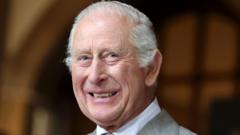In a remarkable display of royal diplomacy, King Charles III is preparing for a historic visit to Canada that is expected to address the growing concerns regarding US President Donald Trump's recent remarks suggesting that Canada should join the United States. This will be the first time a monarch has opened Canada's Parliament in almost 70 years, with many viewing this as a critical moment for Canadian sovereignty.
Former Canadian high commissioner to the UK, Jeremy Kinsman, highlighted the significance of the King's visit, suggesting the speech will not only outline government policies but also send a strong message affirming Canada’s independence. “It’s going to be very affirmative of Canadian sovereignty,” Kinsman noted, emphasizing the importance of the visit following the recent election of Prime Minister Mark Carney, who rose to prominence on an anti-Trump sentiment.
Carney had previously asserted to Trump that Canada "wasn't for sale," and political experts anticipate that the King's address will echo this sentiment. While some speculate that the speech will incorporate personal comments from the King, a balanced approach is expected to be taken to avoid offending the sensitive political landscape, as the King aims for diplomatic harmony without undermining Canadian values.
The King's visit comes at a time when many Canadians are reportedly feeling affronted by Trump's rhetoric, leading to a broader call for respect and acknowledgment of Canada’s autonomy. Political analysts like Mel Cappe predict that phrases like "Canada will never be up for sale" could make an appearance in the speech as a direct response to Trump’s assertions.
Amidst contrasting views on the monarchy's role, some commentators argue against using the royal visit as a political tool. Peter Donolo, from the Canadian International Council, expressed skepticism about the effectiveness of the monarchy in altering the US's perception of Canada. Nonetheless, others, including political science professor Elizabeth McCallion, posit that the King's address could hold considerable weight for a populace that has felt disrespected by the recent political dialogue involving their nation.
As Canadians await the address in Ottawa, expectations are high for a speech that not only reaffirms their sovereignty but also balances the delicate relationship with the United States. Whether King Charles will navigate this challenge successfully serves as a testament to the evolving dynamics of royal influence and international diplomacy in a politically charged era.
Former Canadian high commissioner to the UK, Jeremy Kinsman, highlighted the significance of the King's visit, suggesting the speech will not only outline government policies but also send a strong message affirming Canada’s independence. “It’s going to be very affirmative of Canadian sovereignty,” Kinsman noted, emphasizing the importance of the visit following the recent election of Prime Minister Mark Carney, who rose to prominence on an anti-Trump sentiment.
Carney had previously asserted to Trump that Canada "wasn't for sale," and political experts anticipate that the King's address will echo this sentiment. While some speculate that the speech will incorporate personal comments from the King, a balanced approach is expected to be taken to avoid offending the sensitive political landscape, as the King aims for diplomatic harmony without undermining Canadian values.
The King's visit comes at a time when many Canadians are reportedly feeling affronted by Trump's rhetoric, leading to a broader call for respect and acknowledgment of Canada’s autonomy. Political analysts like Mel Cappe predict that phrases like "Canada will never be up for sale" could make an appearance in the speech as a direct response to Trump’s assertions.
Amidst contrasting views on the monarchy's role, some commentators argue against using the royal visit as a political tool. Peter Donolo, from the Canadian International Council, expressed skepticism about the effectiveness of the monarchy in altering the US's perception of Canada. Nonetheless, others, including political science professor Elizabeth McCallion, posit that the King's address could hold considerable weight for a populace that has felt disrespected by the recent political dialogue involving their nation.
As Canadians await the address in Ottawa, expectations are high for a speech that not only reaffirms their sovereignty but also balances the delicate relationship with the United States. Whether King Charles will navigate this challenge successfully serves as a testament to the evolving dynamics of royal influence and international diplomacy in a politically charged era.



















